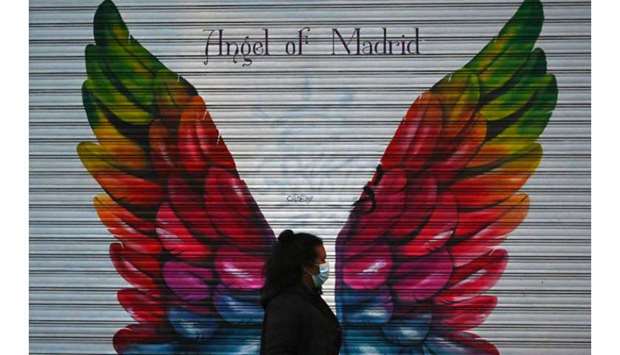Spain broke another national record of daily coronavirus deaths yesterday as more than 40% of the world’s population was asked to stay at home to halt the deadly march of a disease that has claimed some 32,000 lives.
The coronavirus causes the Covid-19 disease.
A deluge of patients are filling up hospitals in Europe and the United States, now the focal points of a pandemic that is upending the global economy in unprecedented ways.
As of yesterday, more than 3.38bn people were asked or ordered to follow confinement measures, according to an AFP database, as the virus infects every sphere of life, wiping out millions of jobs, postponing political elections and pressing pause on the sporting scene.
Worst-hit Italy and Spain, which together account for more than half of the world’s deaths, are clinging to the hope that they are closing in on the peak of the crisis.
But even as the growth rate of infections and deaths slowed in both countries, Madrid announced a rise in its 24-hour toll for a third consecutive day yesterday, with 838 fatalities, while Italy recorded 756.
Spain is toughening already tight restrictions on movement while Italian authorities said that they would extend a shutdown past the April 3 deadline – despite the debilitating economic impact on the most vulnerable.
Health authorities say the measures are needed to free up overstretched hospital wards.
“My ICU (intensive care unit) is completely full,” said Eduardo Fernandez, a nurse at Infanta Sofia hospital in Madrid, where authorities have set-up a 5,500-bed field hospital and transformed an ice rink into a morgue.
“If it is not a complete collapse, we are on the verge,” the nurse added.
Prime Minister Pedro Sanchez, in a televised address to the nation on Saturday night, announced that all non-essential workers must stay at home for two weeks, the latest government measure in the fight against the coronavirus.
He said that workers would receive their usual salaries but would have to make up lost hours at a later date.
The measure would last from March 30 to April 9.
Yesterday Labour Minister Yolanda Diaz said that the measure was “flexible” and workers would be paid but would be expected to make up their lost days before December 31.
“We need to reduce mobility to the level of Sundays,” she said, adding that taking into account the Easter holidays, measures would cover eight working days.
The labour minister added to Prime Minister Sanchez’s calls for the EU to react, saying “we need a Europe in which workers’ rights are reinforced”.
Unions welcomed the measures and business groups CEOE and CEPYME said that while they would comply with the new rule, “it will generate an unprecedented huge impact on the Spanish economy, especially in sectors such as industry”.
The slowdown “may lead to a deeper crisis in the economy that could become social”, they warned in a statement.
Yesterday health emergency chief Fernando Simon repeated a warning that intensive care wards were becoming saturated, but said cases were stabilising and “the rise in new cases has been falling for a few days”.
In Madrid, birdsong drowned out traffic on deserted streets as police reinforced patrols, stopping buses and cars to check passengers had reason to be out of their homes.
The number of beds at a makeshift hospital to treat coronavirus patients in the IFEMA conference centre will soon reach 1,400, Madrid’s regional government said.
It also announced an official period of mourning for those who have died.
Flags will fly at half-mast and a daily minute’s silence will be held.
Schools, bars, restaurants and shops selling non-essential items have been shut since March 14 and most of the population is house-bound as Spain tries to curb the virus.
The pandemic has spurred a worldwide scramble for medical gear as doctors and nurses in some of the world’s wealthiest cities struggle to dole out limited stocks of face masks and life-saving respirators.
More than 667,090 cases of the novel coronavirus have been officially declared around the world since the outbreak began late last year, according to an AFP tally.
Variations in testing regimes mean the true number is likely far higher.
As health facilities in rich countries buckle under the pressure, aid groups warn the toll could be in the millions in poor states and war zones such as Syria and Yemen.
Three billion people around the world lack access to running water and soap, which are the most basic weapons of protection against the virus, according to UN experts.

A woman walks past a closed shop in Madrid during a national lock-down to prevent the spread of the new coronavirus.
